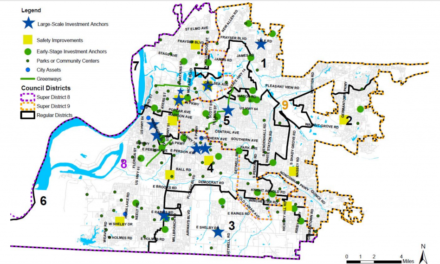Just when there is an encouraging new energy and a feeling of momentum here, we are reminded of the nagging lack of self-worth that surfaces too often in this community.
This time it comes from the recent decision by EDGE to waive $1.16 million to $1.3 million in taxes for $10.60 an hour warehouse jobs. It’s a decision that smacks of an attitude that we have worked so hard to get rid of: that we don’t deserve the best and that “it’s good enough for Memphis.”
But surely, jobs that pay just barely enough to keep a family off welfare represent the consummate “good enough” attitude for Memphis. And in telling the rest of the country that we will take just about anything and are willing to pay for even the lowest paying jobs, we are telling the rest of the country much more: that we think little of ourselves and have little faith in our own future.
Tale of the Tape
Here’s the tale of the tape for the 150 warehouse workers that make up 86% of the jobs being created by the company:
* $22,000 – Annual pay
* $22,400 – Living wage for one adult in Shelby County
* $36,057 – Living wage for two adults (one working)
* $47,636 – Living wage for two adults (both working) and one child
* $56,053 – Living wage for two adults (both working ) and two children
* $64,257 – Living wage for two adults (both working) and three children
EDGE approved a $1.16 million tax waiver for 3530 Raines Road and $1.3 million for 4755 Southpoint Drive. About $224,000 of the tax freeze was money that would otherwise have gone to schools.
Trickling Down
As expected, EDGE delivered up yet another ROI report that showed of course that both sites would create new tax revenue. As usual, the seminal question is whether the company would have come to Memphis any way. In keeping with the choreography that accompanies every PILOT request, the company gave the magic answer that Memphis would only be chosen over North Mississippi if it got the PILOT.
Meanwhile, there is no calculation for the costs of the public services that the warehouse will need and that will now be picked up by local homeowners and small businesses. As a result, in its way, it deepens inequality in Memphis and shifts the tax burden from a company with yearly revenues of $1 billion to working families.
With the total amount of taxes being waived by PILOTs approaching $50 million in Shelby County taxes and likely about $35 million in City of Memphis taxes, our PILOT programs have become local versions of trickle-down economics. They promise that by investing in those who have more, incomes will rise and jobs will be created for the rest of us.
Like trickle-down economics, there is denial in the fact that the evidence shows that it does not work, but more to the point, as a result of it, the priority to give tax cuts to national companies must be offset with higher taxes for working families or cuts in crucial public services.
Good Enough for Memphis
Meanwhile, proponents of the economic theory that everyone will benefit from the trickle-down ignore the chasm of inequality in our midst, but in addition, they also ignore the fact that these policies are not moving us toward being more competitive in the knowledge economy.
Back to the lack of self-worth that has plagued this community for way too long, it often seems to stem from institutional racism – city services are “good enough” for Memphians, budgets can always be cut because they’re “good enough,” public transit is “good enough” for poor Memphians who depend on it, and low-paying jobs are “good enough” as well. It’s an attitude that’s so ingrained into the structure of things here that it’s not even seen any more, except in the “less than” attitude that has been a part of Memphis and Shelby County for so long.
Here’s the thing: when the PILOT program was first created, it was to be temporary stopgap program to give Memphis and Shelby County a trump card in business recruitment, but it was expected in future years to become more and more selective, strategic, and infrequent. Much has changed since the modern PILOT program was created approximately 35 years ago, namely the underlying dynamics of the economy. In this way, the PILOT program’s roots run deep into old school economic development and it does little to respond to the need to support, encourage, and incentivize entrepreneurs and small businesses who drive today’s economy.
Oddly, the tax freeze program is accepted readily by people who otherwise express concern about local government’s “high property tax rates,” which are of course are higher because so many companies are paying no taxes. Meanwhile, the same companies who get a pass on paying taxes here have offices and branches in cities with higher tax burdens.
Too Many Questions Needing Answers
No other city in Tennessee relies on PILOTs as much as Memphis and Shelby County, even those whose metros include other states like ours, and we can’t find a city our size that relies on them as much or grants them for as long as we do here. In fact, we believe nothing has changed since the last study that showed that Memphis and Shelby County have approved more tax waivers than all of the other Tennessee major cities combined.
As a result, the ultimate question remains: how do we create a city and county economy that doesn’t require us to have the PILOT program to compete or at least a PILOT program that doesn’t perpetuate our low-wage, low-skill economy with $10 an hour warehouse jobs?
But there are other key questions:
What exactly is the national context for cities’ business incentives? What precisely are they doing? How many are waiving taxes like we do here? Do any of them waive as many taxes as we do?
It is often said that Memphis is unique in its competitive challenges because the MSA includes two other states. Twenty of the largest 50 metros also include at least two states. How does the largest city in these other metros handle economic recruitment and have they been successful in putting regional strategies in place?
More Questions
Does any other city grant tax freezes to companies that have already received one that is expiring (similar to International Paper getting another 15-year tax freezes on top of its previous 15-year one)?
Should Memphis and Shelby County provide tax waivers to distribution companies which should recognize the benefits of being adjacent and accessible to FedEx and one of the world’s best logistics hubs? At what point can we stop offering incentives for these low-wage jobs?
Should Shelby County Government’s waived taxes exclude any funds that would otherwise have gone to schools (about $10-12 million a year now)?
If a company is not viable enough to pay decent salaries and provide basic benefits, is it in the public interest of Memphis and Shelby County taxpayers to subsidize them?
Often our current economic development strategies seem to be akin to fishing downstream. What could we do to move upstream where we can compete for the really big fish?
The former head of Nashville’s economic development office said, “Incentives should incentivize. Once it becomes an entitlement, it’s no longer an incentive.” Have our tax waivers become an entitlement and if they are, how we can we change the process to make them selective and strategic incentives?
It’s past time to resolve the questions by making the effort to get the facts, to establish the national context, and to consider the elements that should make up an effective, future-looking toolkit of business incentives.
***
Join us at the Smart City Memphis Facebook page for daily articles, reports, and commentaries that are relevant to Memphis.






I would certainly stop offering PILOTs to warehouse relocations. If we were smart we’d start publicizing incentives and PILOTs for relocations of high-tech business, primarily attempting to lure them from Seattle, San Francisco, and Silicon Valley. Creating a high-tech ecosystem in Memphis should be at the top of the agenda, not maintaining the logistics status quo.
Yes, the tax waivers have become an entitlement and have been for many years. Those International Paper executives don’t want to leave their plush, relatively inexpensive homes when they have every cultural amenity they would have in any other city.
And for the warehouses – let them go to Mississippi. These warehouses consume large chunks of land with few jobs no matter the pay level. We don’t need their environmental impact from storm water runoff and heavy truck traffic producing air pollution and further degradation of Lamar Ave (I-22).
Maybe a new City Council and a new Mayor, who are not beholden to the Chamber of Commerce, will be able to reel in the PILOT program and make it fish upstream. Residential taxpayers are you listening? $85 million in property tax annually, if paid by these PILOT companies, can save you a lot of money.
Hi! I’ve been reading your website for a while now and
finally got the bravery to go ahead and give you a shout out from Porter Tx!
Just wanted to tell you keep up the good work!
I understand they are lower paying jobs, but with the report that Memphis has the highest percentage of 16-24 year olds not working or in school, I think this is an improvement. Having jobs for unskilled and uneducated workers are just as important in this city as highly skilled/big income positions.
This camera comes complete full of every
one of the options in the first two wireless security alarms Internet cameras,
but is manufactured by the lesser name company.
Now, this problem is fixed, and if you want to use the camera with your
application, you must add the corresponding line inside the Android – Manifest.
Computer security cameras is now more critical pc has have you ever been, magnified with the common dangers of the net.
The camera on the Nokia E90 supports resolutions of up to 2048 x 1536 pixels with auto-focus and a photo editor.
First of all you can find security options via the Menu button ‘ Settings ‘ Security.